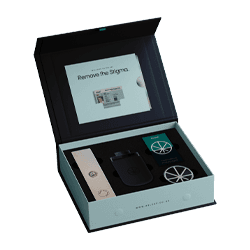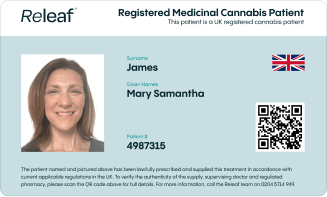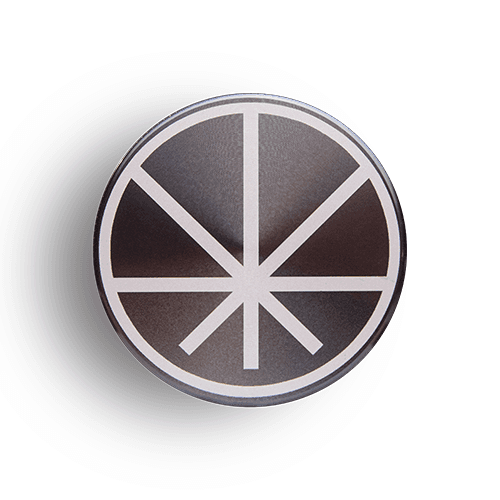Some studies into the effects of CBD, and medical cannabis as a whole, on IBS show that the anti-inflammatory properties of CBD have the potential to improve the quality of life for some of those suffering from gastroenterological conditions such as IBS. With Guts UK reporting that approximately 1 in 20 people in the UK suffer from IBS – which works out to around 3.2 million people – there is clearly a lot of life quality that can be improved.
Here, we will discuss how CBD may be able to help some people suffering from IBS and present some of the research supporting its potential in treating IBS symptoms. We will also explain how to take CBD to treat IBS, as well as highlight some of the other natural remedies that help relieve IBS symptoms.
How can CBD help with IBS?
We will discuss the scientific research supporting the use of CBD to treat IBS in more detail in the next section, but first, we will provide a quick overview of the effects of CBD on the digestive system, inflammation, and its potential to alleviate IBS symptoms.
CBD’s effects on the digestive system
A growing body of evidence stretching back several years strongly suggests that the activation of cannabinoid receptors in the body’s endocannabinoid system can be beneficial for discomfort and pain in the gut and digestive system.
CBD’s ability to reduce inflammation
In a 2021 study on the effects of cannabinoids on inflammation conducted by members of the Sackler Institute of Pulmonary Pharmacology at King's College London, the authors confirm that they discovered that properly formulated CBD does indeed exhibit appropriate ‘anti-inflammatory activity’.
CBD’s potential to alleviate IBS symptoms
The documented anti-inflammatory properties of CBD certainly suggest that they can help reduce the impact of IBS symptoms, although it should be noted that there is no guarantee that it will work for every individual. It is also posited by multiple researchers that CBD may help decrease gut motility, which is the movement of food, liquids and waste through the digestive system. CBD may therefore also benefit those suffering severe diarrhoea and bowel cramps as a symptom of IBS.
Now let’s look closer at some of the scientific research supporting CBD as a treatment for IBS.
Research studies on CBD and IBS
Studies into the effects of CBD on various aspects of physical and mental health have been going on for years, with many of them focused on the effects of CBD on conditions like IBS and IBD. While more research is needed for a truly detailed understanding, the research so far seems to be in agreement that CBD can have a positive impact on certain IBS symptoms in significant amounts of people.
While also noting that an IBS-diet and stress-relief practice were required to boost the beneficial effects of any treatment, a 2020 study into IBS treatments conducted by researchers from the Universities of Padua and Naples in Italy discovered that manipulating the endocannabinoid system (ECS) had multiple benefits in treating IBS. The authors concluded “Although the pathophysiology of IBS remains unclear, targeting the ECS may represent a promising strategy to modulate gut motility, visceral hyperalgesia, low-grade intestinal inflammation, and gut-brain axis alteration, all features that may improve IBS symptoms onset.”
An earlier study from 2018 from the United States looked even closer at the relationship between cannabinoids and gastrointestinal motility, ultimately concluding that “cannabinoid mechanisms are involved in control of gastrointestinal and colonic motility”.
There is even cannabinoid research from as far back as 2009 which contains a statement in the executive summary confirming that the research discovered cannabinoids suppressed inflammatory response and subsequently could “attenuate disease symptoms”.
More recently, research into the effects of cannabis oil on serious irritable bowel conditions discovered that participants reported a higher quality of life when taking CBD oil, compared to participants on placebos.
Despite the amount of research already conducted, it’s important to remember that some of these studies are quite limited in scope with relatively small sample sizes. We also need more of them to build a more detailed picture of the benefits of CBD for treating IBS.
It should also be remembered that various diet and lifestyle changes remain the most common professional medical advice for treating IBS symptoms and that CBD should be seen as a complementary therapeutic opinion, and not some kind of magic cure-all.
How to take CBD for IBS
CBD can be imbibed in a variety of ways. The most common included inhalation (through a vaporiser), as well as by eating various edible products containing CBD, or administering a tincture sublingually (under the tongue).
Oils and tinctures are one of the fastest-acting methods for taking CBD, though inhalation will offer the most rapid onset of effects. If you prefer taking CBD via an edible, then be aware that the effects can take a couple of hours to fully kick in so be careful not to take another dose until after this timeframe.
CBD dosage and precautions
If you want to try CBD to see if you are one of the people whose IBS symptoms can be reduced with it, then you must always start with a low dose and build up the dose incrementally until it becomes noticeably effective. This is because there can be some non-serious side effects if too high a dose is taken. Such side effects include:
- Light-headedness
- Low blood pressure
- Drowsiness
CBD products for IBS
- Full-spectrum CBD contains all of the cannabinoids, terpenes and flavonoids, as well as the largest trace amounts of THC in CBD products. Here in the UK, CBD can only contain a maximum of 0.2% THC, unless prescribed by a specialist physician.
- Broad-spectrum CBD contains most of the cannabinoids, terpenes, and flavonoids, but should have the majority of the trace amounts of THC removed.
- CBD isolate should have all THC trace amounts removed as well as all of the other components, leaving a 99% pure CBD product.
Other natural remedies for IBS
Probiotics are beneficial to IBS sufferers as they can slow down the movement inside the colon, which in turn reduces the number of bowel excavations required per day. Probiotics are also thought to improve stool consistency.
Patients with IBS are often advised by physicians to increase their intake of dietary fibre as it can help regulate stool consistency and even reduce abdominal pain and meteorism.
Peppermint oil is an antispasmodic which relaxes the bowel wall to relieve stomach cramps and bloating in some people suffering from IBS. It can also help reduce excessive flatulence.
Conclusion
A growing amount of scientific research certainly supports the idea that CBD can help with IBS, though it is also true that even more studies are needed to learn even more about the positive effects of CBD on IBS.
Want to learn more?
Well, you've come to the right place!
Releaf is committed to helping you access the benefits of a medical cannabis service. Our monthly packages are tailored to your cannabis prescription, and we offer specialist consultations for medical cannabis and a unique medical cannabis card for protection.





